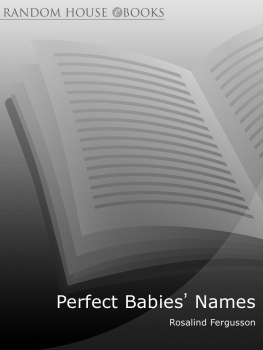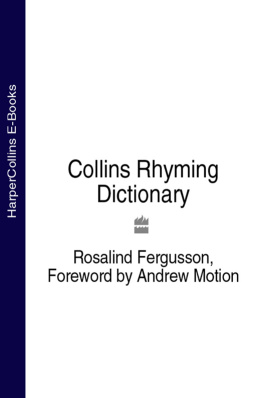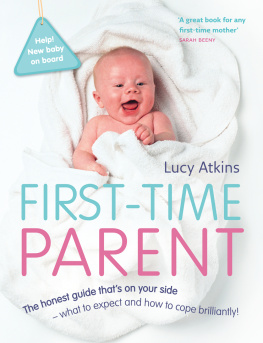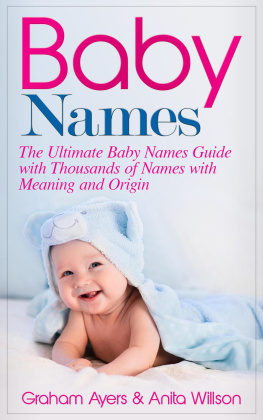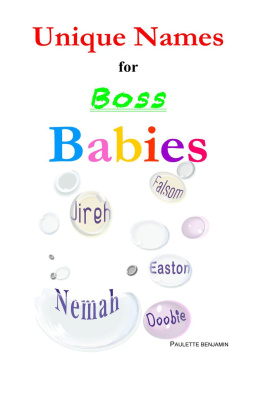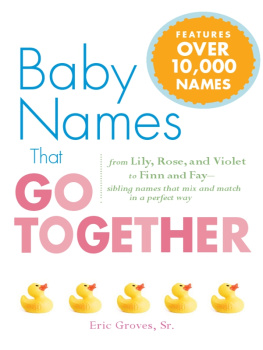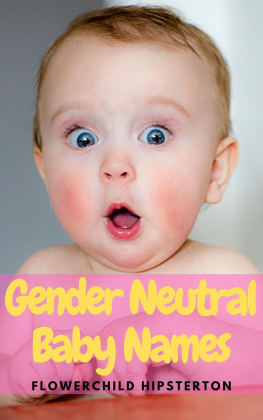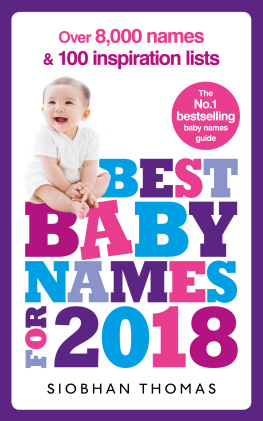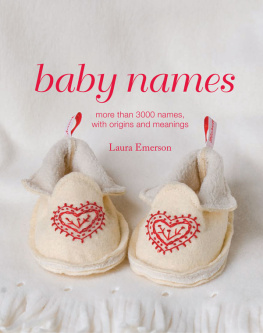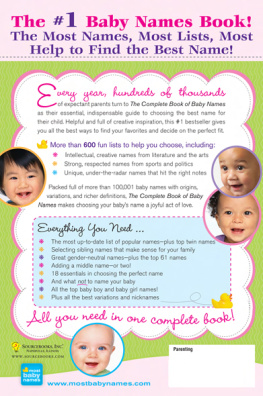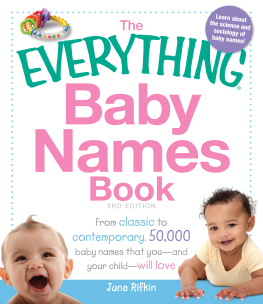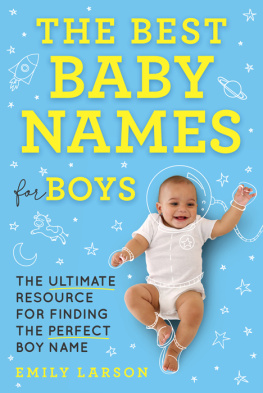Contents
About the Book
Do you need help finding the perfect name?
Are you unsure whether to go for something traditional or something more unusual?
Do you want to know a bit more about the names you are considering?
Perfect Babies Names is an essential resource for all parents-to-be. Taking a close look at over 3,000 names, it not only details each names meaning and history, it also tells you which famous people have shared it over the years and how popular or unpopular it is now. With tips on how to make a shortlist and advice on avoiding names that give rise to unfortunate nicknames, Perfect Babies Names is the ultimate one-stop guide.
The Perfect series is a range of practical guides that give clear and straightforward advice on everything from getting your first job to choosing your babys name. Written by experienced authors offering tried-and-tested tips, each book contains all you need to get it right first time.
About the Author
Rosalind Fergusson, a former teacher, is a freelance writer and editor with a wide range of reference books to her name. She lives in Kent with her husband David and occupies her leisure time with walking, sailing, literature, and music.
Other titles in the Perfect Series
Perfect Answers to Interview Questions Max Eggert
Perfect Best Man George Davidson
Perfect CV Max Eggert
Perfect Interview Max Eggert
Perfect Numerical Test Results Joanna Moutafi and Ian Newcombe
Perfect Personality Profiles Helen Baron
Perfect Psychometric Test Results Joanna Moutafi and Ian Newcombe
Perfect Pub Quiz David Pickering
Perfect Punctuation Stephen Curtis
Perfect Readings for Weddings Jonathan Law
Perfect Wedding Speeches and Toasts George Davidson
Introduction
Choosing a name for your new baby can be a difficult task. Only when your child grows up will you know whether you made the right choice. If you have already decided to name your daughter or son after a particular person a beloved relative, perhaps, or a current celebrity you will probably not be reading this book. However, if you remain undecided, or if you want to make sure that your chosen name has a pleasant meaning and no undesirable associations, then Perfect Babies Names will give you useful guidance and plenty of new ideas.
The range of names that people give their babies is constantly expanding. Fifty years ago, children given one of the top ten names for their year of birth were sure to have at least one classmate with the same name (and sometimes two or more). This still happens, but less often. Not only are there new additions from other cultures and countries, but there is also a growing tendency to convert surnames (such as Mason or Paige) into forenames and to use short forms (such as Freddie or Millie) as names in their own right.
In this book you will find more than 3,000 names used in the English-speaking world, including a selection of Welsh, Scottish, Irish, Jewish, Indian, and Arabic names. The meaning of each name is given (where known), usually followed by further information that may influence your decision, such as famous bearers or other associations of the name. Whether you choose to read the book from A to Z, or simply open it at random and pick a name from that page, is entirely up to you!
Using the book
- The names are listed in alphabetical order, labelled ( M ) for boys and ( F ) for girls. Unisex names that have the same origin are labelled ( M/F ) if the name is more commonly given to boys and ( F/M ) if the name is more commonly given to girls.
- Names that have accents (such as Chlo or Ren) are increasingly written without them in modern times, partly because of the difficulty of producing accented letters on a computer. So the main form of these names is given as Chloe, Rene, etc., but the accents are shown in an ALTERNATIVE FORM at the end of the entry.
- A pronunciation guide is given for some of the more difficult names, such as Sinead [shi- NAID ]. These are spelt out to make them readable without using special symbols for particular sounds, with two exceptions: [zh] for the sound in the middle of the word measure and [dh] for the sound in the middle of the word mother.
- At the end of some entries you will find lists of RELATED NAMES . These include short forms that have become established as names in their own right (e.g. Abby and Gail for Abigail), alternative forms of the name that are very different, often because they come from other languages (e.g. Sean and Ian for John), and names that basically have the same meaning (e.g. Margaret and Pearl).
- At the end of the book there are lists of the most popular names in the UK for various years since 1974. The most recent lists will show you which names are currently in and out of fashion, and whether the name you have chosen is as unusual as you think it is.
Top ten tips
- Choose a set of names that sound good together, but beware of initials that spell a word, such as Frederick Adam Thomas.
- Read the chosen first name and surname aloud, to avoid a combination that sounds like a common word or phrase (such as Isla White, Paige Turner, Joe King, or Robin Banks).
- Do not spell a common name in an unusual way just to be different (such as Dayzi for Daisy). Your child will soon get tired of having to spell it out to everybody.
- If you do not know how to pronounce a particular name (such as the Irish boys name Oisin), do not choose it. Other people will have the same problem.
- Consider how the name could be shortened by your childs friends. You may think that Dorcas is a nice, unusual name for a girl, but would you want to hear your daughter called Dork?
- Many popular babies names are short forms of other names. However, if you want to call your little girl Charlie, for example, it may be better to put the full form on her birth certificate. That way, if she tires of her unisex name in later life, she can reinvent herself as Charlotte or even Lottie.
- If you choose an unusual first name for your child, it is a good idea to add a more conventional middle name, which can be used instead if your child does not want to stand out from the crowd. And vice versa.
- It is useful to have a middle name, but do not give your child too many forenames. Remember that space is limited on forms that ask for a persons full name.
- Many people are proud to bear a name that has been in the family for generations, but if it sounds particularly old-fashioned, consider using a related name instead.
- Each of your children is an individual. Do not choose a younger childs name simply because it goes with the name of his or her elder brother or sister. And if all of your children have the same initial, they may end up opening one anothers mail by accident.
A
Aaliyah ( F ) the feminine form of the Arabic name Ali (sublime). It was borne by a US singer who died in a plane crash in 2001 at the age of 22.
ALTERNATIVE FORM : Aliyah.
Aaron [ AIR -un] ( M ) a biblical name, possibly meaning high mountain. In the Bible, Aaron is the brother of Moses and first high priest of the Israelites. Famous modern bearers include the US composer Aaron Copland. Aaron was the middle name of the US singer Elvis Presley.
Next page
